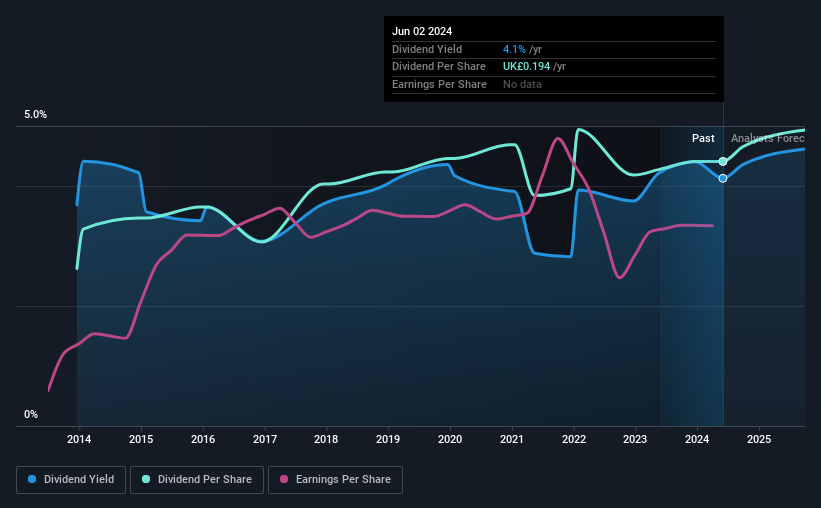Why It Might Not Make Sense To Buy Jersey Electricity plc (LON:JEL) For Its Upcoming Dividend
Some investors rely on dividends for growing their wealth, and if you're one of those dividend sleuths, you might be intrigued to know that Jersey Electricity plc (LON:JEL) is about to go ex-dividend in just three days. Typically, the ex-dividend date is one business day before the record date which is the date on which a company determines the shareholders eligible to receive a dividend. The ex-dividend date is important as the process of settlement involves two full business days. So if you miss that date, you would not show up on the company's books on the record date. In other words, investors can purchase Jersey Electricity's shares before the 6th of June in order to be eligible for the dividend, which will be paid on the 24th of June.
The company's next dividend payment will be UK£0.084 per share, on the back of last year when the company paid a total of UK£0.19 to shareholders. Last year's total dividend payments show that Jersey Electricity has a trailing yield of 4.1% on the current share price of UK£4.70. If you buy this business for its dividend, you should have an idea of whether Jersey Electricity's dividend is reliable and sustainable. So we need to investigate whether Jersey Electricity can afford its dividend, and if the dividend could grow.
View our latest analysis for Jersey Electricity
Dividends are usually paid out of company profits, so if a company pays out more than it earned then its dividend is usually at greater risk of being cut. Jersey Electricity paid out 54% of its earnings to investors last year, a normal payout level for most businesses. Yet cash flow is typically more important than profit for assessing dividend sustainability, so we should always check if the company generated enough cash to afford its dividend. Over the past year it paid out 138% of its free cash flow as dividends, which is uncomfortably high. We're curious about why the company paid out more cash than it generated last year, since this can be one of the early signs that a dividend may be unsustainable.
Jersey Electricity does have a large net cash position on the balance sheet, which could fund large dividends for a time, if the company so chose. Still, smart investors know that it is better to assess dividends relative to the cash and profit generated by the business. Paying dividends out of cash on the balance sheet is not long-term sustainable.
While Jersey Electricity's dividends were covered by the company's reported profits, cash is somewhat more important, so it's not great to see that the company didn't generate enough cash to pay its dividend. Were this to happen repeatedly, this would be a risk to Jersey Electricity's ability to maintain its dividend.
Click here to see how much of its profit Jersey Electricity paid out over the last 12 months.
Have Earnings And Dividends Been Growing?
Companies that aren't growing their earnings can still be valuable, but it is even more important to assess the sustainability of the dividend if it looks like the company will struggle to grow. If business enters a downturn and the dividend is cut, the company could see its value fall precipitously. With that in mind, we're not enthused to see that Jersey Electricity's earnings per share have remained effectively flat over the past five years. It's better than seeing them drop, certainly, but over the long term, all of the best dividend stocks are able to meaningfully grow their earnings per share.
Many investors will assess a company's dividend performance by evaluating how much the dividend payments have changed over time. Jersey Electricity has delivered 5.3% dividend growth per year on average over the past 10 years.
The Bottom Line
Should investors buy Jersey Electricity for the upcoming dividend? Earnings per share have not grown and Jersey Electricity's profit payout ratio looks reasonable. However, it paid out a disconcertingly high percentage of its cashflow, which is a worry. Bottom line: Jersey Electricity has some unfortunate characteristics that we think could lead to sub-optimal outcomes for dividend investors.
With that in mind though, if the poor dividend characteristics of Jersey Electricity don't faze you, it's worth being mindful of the risks involved with this business. To help with this, we've discovered 2 warning signs for Jersey Electricity (1 is concerning!) that you ought to be aware of before buying the shares.
A common investing mistake is buying the first interesting stock you see. Here you can find a full list of high-yield dividend stocks.
Have feedback on this article? Concerned about the content? Get in touch with us directly. Alternatively, email editorial-team (at) simplywallst.com.
This article by Simply Wall St is general in nature. We provide commentary based on historical data and analyst forecasts only using an unbiased methodology and our articles are not intended to be financial advice. It does not constitute a recommendation to buy or sell any stock, and does not take account of your objectives, or your financial situation. We aim to bring you long-term focused analysis driven by fundamental data. Note that our analysis may not factor in the latest price-sensitive company announcements or qualitative material. Simply Wall St has no position in any stocks mentioned.

 Yahoo Finance
Yahoo Finance 
